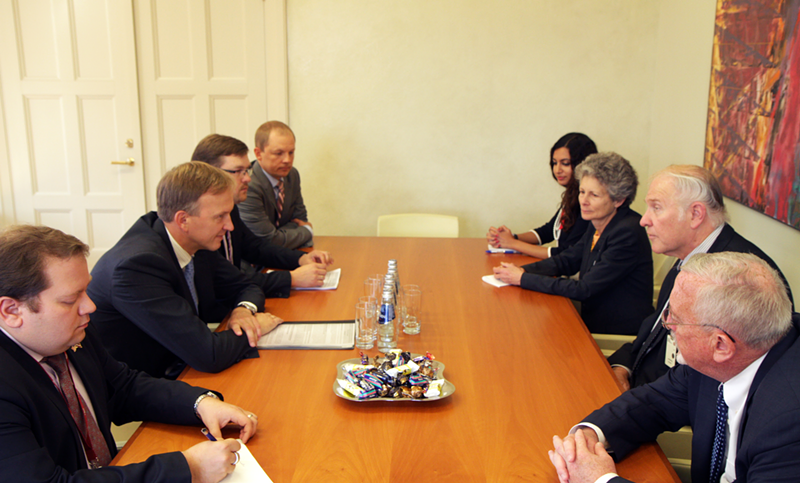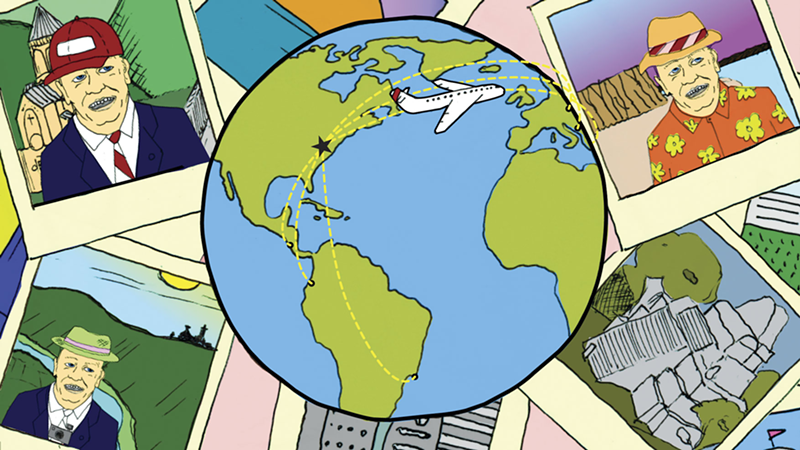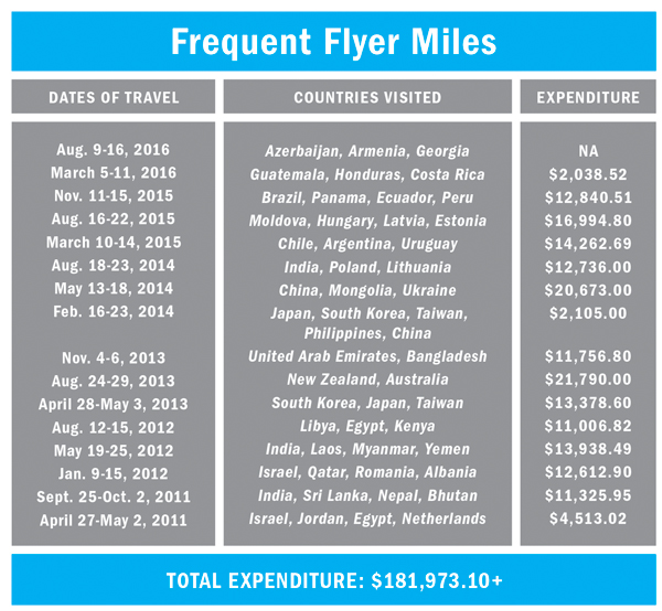In a self-portrait, Steve Chabot would draw himself as an eagle or a hawk, keeping a sharp eye on federal extravagance and clawing it apart. His thriftiness carries over into his personal life. He drives a 16-year-old Ford Explorer in Cincinnati and a 22-year-old Chevrolet Cavalier in Washington, D.C. He lives in working-class Westwood in a house tax-assessed at less than $150,000. When Congress is in session, he crashes in his office instead of springing for an apartment or hotel.
“Steve has consistently voted to eliminate wasteful spending and reduce the excessive tax burden on hard-working Americans,” Chabot’s website says.
Yet Chabot, a 20-year Congressman, cages his budget hawk self when it comes to travel. Since rebounding from his 2008 loss to Steve Driehaus and returning to the U.S. House of Representatives in 2011, Chabot has flown to 46 countries on 16 separate excursions, gracing the likes of Mongolia, Myanmar and Moldova with his presence. The tab to taxpayers? Almost $200,000. Double that if you count the House committee staffer, Kevin Fitzpatrick, who usually joins him.
Chabot sits on the House Small Business, Foreign Affairs and Judiciary committees. His most prominent title, though, is chairman of the Small Business Committee. Its job it is to “protect and assist” small businesses. It oversees matters “related to business financial aid, regulatory flexibility and paperwork reduction” and the Small Business Administration.
Somehow, that road leads to the Moldovas of the world. Since taking over leadership of the small business panel in early 2015, Chabot has traveled overseas five times on its behalf. His last trip, in August, was a one-week summertime jaunt through Azerbaijan, Georgia and Armenia.
“The purpose of the mission was to assess the current status of U.S. relations with each of these nations, including economic, political, military and national security issues,” Chabot states in his Congressional blog entry of Aug. 17. “I learned a lot.”
That he did. He says he was clued into Azerbaijan’s corruption and Georgia’s claim to be the “most pro-American nation on earth.” He observed that Mt. Ararat can be seen from the Armenian capital of Yerevan.
Chabot met with a number of government and business representatives during the trip. But what did he accomplish? His blog doesn’t say.
Chabot, who faces challenger Michele Young in the Nov. 8 election, declined to be interviewed by CityBeat. Instead, he and his staff emailed statements explaining Congress’ responsibility of examining foreign policy decisions made by the White House.
“Forming accurate assessments of these decisions requires a lot of research, analysis and fact-finding beyond the information provided to Congress by the administration,” Chabot wrote. “And a significant part of that effort is meeting with foreign officials, both here in the U.S. and overseas in their home countries. If members of Congress do not conduct proper due diligence and do not have knowledge, understanding and experience independent of the executive branch, then they cannot properly exercise their oversight responsibilities.”
That due diligence work, he adds, extends to what he does for U.S. small businesses.
“It would be highly irresponsible for Congress to take the administration’s word for it and approve a trade deal, without performing our due diligence.” He said that requires, in part, “gaining first-hand knowledge of the people, places and issues with which our nation is dealing overseas.” Chabot is fluent in no language other than English.
Another conservative Congress member, Thomas Massie of Northern Kentucky, hasn’t traveled abroad at all on the taxpayer’s dime, based on reports filed with the House clerk’s office. Elected in 2012, Massie serves on committees overseeing transportation, infrastructure, space, science, technology and government reform. One of his prevailing views is that government, like businesses, should spend within its means.
Brad Wenstrup, the Ohio Congress member from Cincinnati’s east side, is an infrequent traveler. Now in his fourth year in office, the Republican took one major trip with the House Armed Services Committee, to Afghanistan, Chad, Cameroon, Kenya and the United Arab Emirates in March 2014. He spent two days in Thailand and Myanmar last December for the House Intelligence Committee. And he was part of a Congressional delegation that went to France for the 70th anniversary of D-Day.
“In general, the Congressman participates in official overseas travel when necessary to provide first-hand, on-the-ground knowledge and insight into his work in the House of Representatives,” says Wenstrup spokeswoman Meghan Waters.
Chabot views foreign travel as essential. Overseeing trade agreements, says spokesman Brian Griffith, requires “significant analysis, follow-up and groundwork.
“It cannot be done by sitting in an office,” Griffith says. “A member of Congress must talk with his or her counterparts in foreign nations. These meetings take place both in D.C. and overseas.”
As a result, Chabot takes an average of three trips a year. In March 2015, he went to Chile, Argentina and Uruguay for four days, at a cost of $14,263. Five months later he spent six days in Moldova, Hungary, Latvia and Estonia, for $16,995. Three months after that he was in Brazil, Panama, Ecuador and Peru for four days, for $12,841.
Chabot did not blog about those trips, nor would he provide CityBeat with any accomplishments. The House Small Business Committee, which paid for the trips, disclosed neither their intent nor their outcomes.
Aaron Scherb, director of legislative affairs for Common Cause, a Washington-based advocacy for open government, says more disclosure should be required.
“We certainly think Congressman Chabot’s constituents and American taxpayers deserve to fully know and understand the purpose of these trips overseas, what was gained by them and how it relates to this small committee’s jurisdiction,” Scherb says.
Foreign travel agendas filed with the House clerk’s office show that Chabot packed a healthy number of meetings with economic ministers and business groups into his visits. CityBeat emailed a dozen of those. Most either didn’t reply or suggested contacting a U.S. embassy.
Felipe Espinosa, executive director of the Ecuadorian-American Chamber of Commerce, says Chabot offered hope to Ecuadorian businesses looking to expand in the U.S.
“As I recall, Congressman Chabot’s visit gave us the opportunity to put him in contact with our members who either have commercial interchange and/or were interested in increasing or starting one with the USA and particularly Ohio,” Espinosa said by email.

Foreign affairs spokesmen in Hungary and Latvia confirm that Chabot dropped in and talked about two-way investment between their countries and the U.S. Another subject: the proposed Transatlantic Trade and Investment Partnership, the Euro-version of the controversial Trans-Pacific Partnership.
“Mr. Chabot and Mr. (Hungarian Deputy State Secretary Kristof) Altusz both agreed that, once in effect, the free trade agreement would pave the way for a future strengthening of bilateral trade and investment relations,” said Sajto’ Fo”oszta’ly, a spokesman for Hungary’s Ministry of Foreign Affairs and Trade.
And Moldova? Trade between the U.S. and Moldova is so negligible that the U.S. Bureau of Economic Analysis can’t even put a dollar value on it. Chabot spent two days there. He met President Nicolae Timofti, other officials and some grape farmers. One of Chabot’s goals in visiting foreign countries is to open them to U.S. small business exports. Fifteen months after his pilgrimage to Moldova, neither Chabot nor Moldova had any trade breakthroughs to report.
Tatiana Solomon, charge’ d’affaires in the Moldovan embassy in Washington, praises Chabot for his visit.
“It helped a lot because with his background and experience, maybe he knows how to move forward some things and give ideas to small business in Moldova,” Solomon says.
Taxpayers who wonder how their money was spent on Congressional travel overseas will be disappointed to learn that, for all the gains in governmental transparency, itemized travel expense reports are not publicly available. A House spokesman said it falls to individual members to disclose their travel spending details.
CityBeat obtained copies of reports for four of Chabot’s most recent trips. But they contain summary costs and not the cost of hotel stays and meals, let alone attached receipts. Try to pull that off if you’re a government employee.
Scherb says Common Cause advocates detailed travel reports that are searchable online by Congress members’ names.
“While Common Cause sees an educational benefit for members of Congress conducting overseas, government-sponsored travel in many cases, we deserve to know how our tax dollars are being spent,” he says. “Without foreign travel spending being fully transparent and accessible, taxpayers should be questioning whether certain trips are junkets with little taxpayer value.”
CONTACT JAMES McNAIR: [email protected] / @JMacNews on Twitter / 513-665-4700, x. 142



